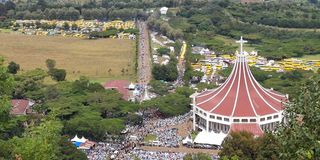Could religious organizations bill streamline Nakuru loud churches?

National shrine in Subukia subcounty.
“Eh Baba!! Eh Babaaa!!!”
Cue in the meme of the pianist adjusting the keyboard keys to match the tune of the choir lead, who is always off-key.
This, according to many residents, often starts on Friday depending on the estate, goes through all Saturday, and the main service on Sunday, for many Christians.
Faith has long been the heartbeat of Nakuru and the country at large, with the sound of worship rising from makeshift and tin-roofed reserves to cathedrals alike.
On September 24, 2024, Mtaa Wangu did a story of how residents at Eastmore, Kiamunyi, and Kiratina in Nakuru East complained of churches in their estates being inconsiderate with their loud music interrupting their morning and evening schedules.
But as communities grow and evolve, new questions about how faith is practiced and expressed have begun to emerge.
How loud should a church service be in a residential neighborhood? Should places of worship be allowed to operate in pubs or business premises?
Where is the line between religious freedom and public order? And how can the state protect citizens from manipulation and excesses without infringing on the sacred right to worship?
It is against this backdrop that the State Department for National Government Coordination invited public submissions on the Draft Religious Organizations Policy and the accompanying Religious organizations Bill, 2024.
The proposed framework seeks to regulate registration, governance, and accountability of faith-based entities across the country.
According to the draft documents, the policy’s objective is to strengthen oversight in the religious sector, safeguard freedom of worship, and prevent exploitation, extremism, and other abuses conducted under the guise of faith.
Members of the public have been asked to submit written memoranda and feedback.
Both the draft policy and bill are available for review on the website of the Office of the Prime Cabinet Secretary.
